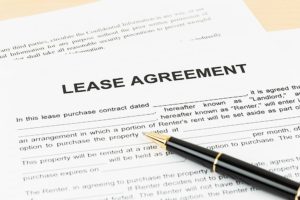7 Items That Every Lease Needs To Have
Posted by JD Esajian // August 8, 2016

As a landlord your lease is everything. Without a well written lease for your protection you leave yourself open to liability, litigation and financial loss. It is not enough to use the first lease you find online. Your lease needs to be tailored specifically to the property, the market and your personal preferences. Anything that you find important needs to be stated in the lease. It may be too late to settle a dispute or enforce a policy after your tenant is already in the property. Before you get too far in finding your next tenant you should take a minute to review your lease and make any changes you feel necessary. Here are seven items that need to be addressed in every lease.
- Pets. Whether or not to lease to a tenant with pets is one of the more debated topics among landlords. On one hand pets can cause subtle damage to the floors and furniture in addition to leaving a lasting smell that is often difficult to get rid of. On the other hand pet owners account for nearly 40% of all potential tenants. Ignoring this market can dramatically decrease the pool of renters. Whatever your stance on pets is you need to address it on your lease. Certain pets can be more problematic than others so it is ok to restrict which pets you deem acceptable. If you are against pets of any kind in your property it should be stated clearly on your marketing and highlighted throughout your lease.
- Smoking. Over the years the number of smokers in general has declined by a significant margin. That being said it is still something that needs to be addressed on your lease. The first thing you need to figure out is what kind of tolerance you have for smoking in the property. Much like pets smoking leaves a lasting odor that can impact the rentability for several years. Many owners do not allow smoking of any kind in the property at all. There are some owners who allow for certain designated locations outside of the property. With this they clearly indicate where and how the butts must be disposed.
- Noise/Complaints. Each tenant has their own unique set of issues and problems. When renting to college students and younger tenants in general you need to make sure you have something in your lease regarding noise and complaints. If you are constantly getting calls from the neighbors, town officials and local police you need to have a policy in place that can terminate the lease. This can be based on a certain number of times you get called or if the complaints are severe enough. A popular remedy for this is imposing a three strike policy. If there are three documented complaints you have the right to enforce action. It is very important that you make this clear with any new tenants and that it is stated on your lease.
- Condition. As a landlord you walk the fine line between giving your tenants privacy and making sure your property is in good standing. It is certainly well within your rights to call for monthly periodic walkthroughs of the property. As long as you give your tenants fair warning there should be no issues. On these walkthroughs if the condition is alarming you need to have something in place to force action. You should have something on the lease that gives you the authority to terminate the lease if there is severe property damage.
- Expenses. Who is going to pay the water bill? How about the snow removal? Are you going to cut the grass? Every expense on the property needs to be clearly defined on the lease. Something as seemingly minor as the garbage removal bill can be an issue with your tenant. You need to also make it known what bills will be in their names and if there are any restrictions on usage.
- Insurance. The insurance on a rental property is often a confusing item for tenants. As the owner you have homeowners insurance that offers protection in the event of damage or liability. This insurance is solely for you and not your tenants. If your tenant wants to protect their personal items they need to acquire specific renters insurance. They do not need to have this to live in the property but if there is damage of any kind they will not be insured. This section of the lease should not be glossed over. The odds are that nothing will happen during the lease but you should always prepare your tenant for the worst case scenario.
- Security Deposit/Move Out Condition. Before your tenant moves in you need to clearly define the move out policies. As you get closer to lease end your tenants will ask about their security deposit and how quickly they can have it. By law you are allowed up to 30 days after the lease to release these funds. In most cases you will send them out much quicker but only after you are comfortable with the condition. It is too late to take action if you find a hole in the closet a week after your tenants moved out. Make it clear to that you will not issue the security until after the lease is over and you have time to inspect the property.
Going over the lease line by line can be tedious and sometimes frustrating but it is often your last line of defense if something unexpected happens. Whatever you want on your lease needs to be on it before anyone signs on the dotted line.
